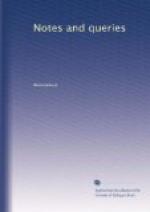I do not profess, as I said before, to give the root of noise. But it is probably the same as of noisome, annoy, the French nuire, Latin nocere, which brings us again to noxa; and the French word noise has probably the same root, though its specific meaning is different from that of our word noise. Without venturing to assert it dogmatically, I should expect the now usual meaning of noise to be its primary meaning, viz. “a loud sound” or “disturbance;” and this accords with my notion of its alliances. The French word bruit has both the meanings of our word noise; and to bruit and to noise are with us interchangeable terms. The French bruit also has the sense of a disturbance more definitely than our word noise. “Il y a du bruit” means “There is a row.” {139} I mention bruit and its meanings merely as a parallel case to noise, if it be, as I think, that “a loud sound” is its primary, and “a rumour” its secondary meaning.
I have no doubt there are many instances, and old ones, among our poets, and prose writers too, of the use of the noun annoy. I only remember at present Mr. Wordsworth’s—
“There, at Blencatharn’s rugged
feet,
Sir Lancelot gave a safe retreat
To noble Clifford; from annoy
Concealed the persecuted boy.”
3. Parliament.—FRANCISCUS’s etymology of Parliament (Vol. ii., p. 85.) is, I think, fit companion for MR. HICKSON’s derivations of news and noise. I take FRANCISCUS for a wag: but lest others of your readers may think him serious, and be seduced into a foolish explanation of the word Parliament by his joke, I hope you will allow me to mention that palam mente, literally translated, means before the mind, and that, if FRANCISCUS or any one else tries to get “freedom of thought or deliberation” out of this, or to get Parliament out of it, or even to get sense out of it, he will only follow the fortune which FRANCISCUS says has befallen all his predecessors, and stumble in limine. The presence of r, and the turning of mens into mentum, are minor difficulties. If FRANCISCUS be not a wag, he is perhaps an anti-ballot man, bent on finding an argument against the ballot in the etymology of Parliament: but whatever he be, I trust your readers generally will remain content with the old though humble explanation of parliament, that it is a modern Latinisation of the French word parlement, and that it literally means a talk-shop, and has nothing to do with open or secret voting, though it be doubtless true that Roman judges voted clam vel palam, and that palam and mens are two Latin words.
C.H.
* * * * *
SHAKSPEARE’S USE OF THE WORD “DELIGHTED.”




